Tepezza Lawsuit vs Similar Drug Lawsuits: A Comparative Analysis
- Last Updated: February 16th, 2026
Key Takeaways
With its unique allegations and potential impact, the Tepezza lawsuit stands out from the crowd.
Being part of a Tepezza hearing loss lawsuits class action lawsuit ensures that all plaintiffs with tepezza cases receive equal treatment under the law.
The outcome of Tepezza lawsuits has the potential to set a precedent for future hearing cases and influence how drug manufacturers approach patient monitoring.
Tepezza Lawsuit vs Similar Drug Lawsuits: A Comparative Analysis
Did you know that the Tepezza product liability case is making waves in the pharmaceutical industry?
Unlike other drug lawsuits, this legal battle focuses specifically on tinnitus as an adverse reaction.
With its unique allegations and potential impact, the Tepezza lawsuit stands out from the crowd.
This case could set a precedent for future litigations against pharmaceutical companies facing similar claims of product liability.
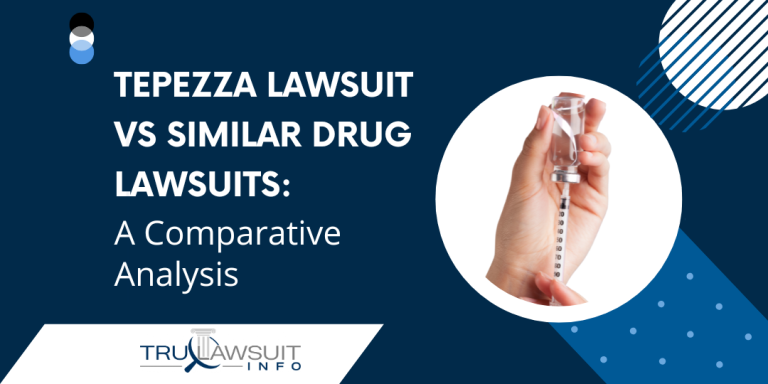
When comparing Tepezza to previous product liability cases, distinct differences emerge in both plaintiff allegations and compensation demands.
The costs involved in multidistrict litigation and average payouts could surprise you.
It’s clear that this lawsuit alleges a perplexing nature and has caused a burst of controversy.
Recent Developments in Tepezza Hearing Loss Lawsuits
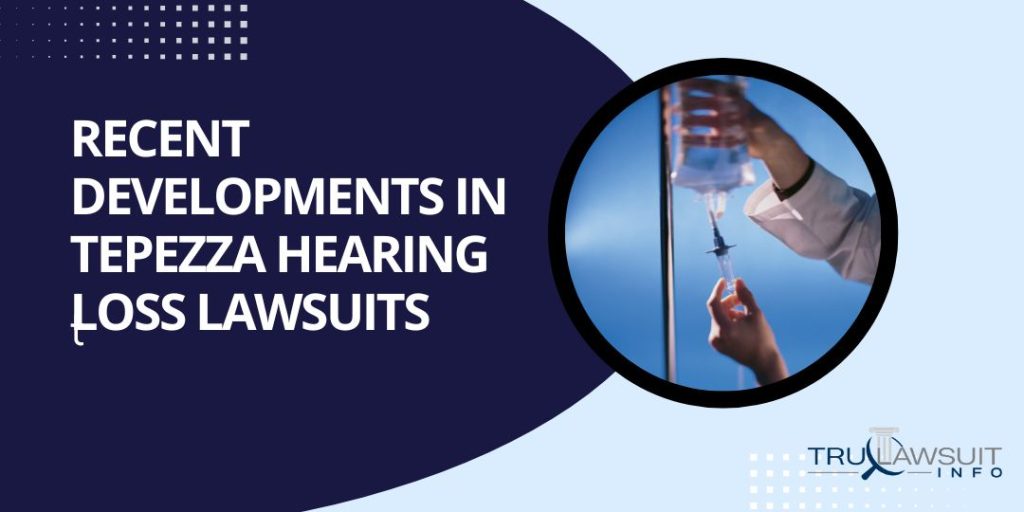
The use of Tepezza, a prescription drug primarily prescribed for thyroid eye disease (TED), has recently come under scrutiny due to its potential link to tinnitus side effects.
As investigations into this matter continue, an increasing number of individuals are filing lawsuits seeking compensation for their alleged hearing issues caused by using Tepezza and its related side effects.
With each passing day, the number of filed Tepezza lawsuits and its related side effects, including tinnitus and hearing loss, continues to rise as more people come forward with similar claims.
These cases shed light on the potential liability of the manufacturer regarding the allegations of hearing loss associated with Tepezza.
Plaintiffs involved in these lawsuits claim that their use of Tepezza resulted in varying degrees of hearing loss, including tinnitus and related side effects.
Many have experienced symptoms such as sensorineural hearing loss, which affects the ears and auditory nerve pathways.
This type of hearing loss can be permanent and significantly impact one’s quality of life.
To support their claims, plaintiffs undergo comprehensive medical evaluations.
These tests help establish a correlation between the use of Tepezza and potential tinnitus, related side effects, dangerous drug lawsuits, and treatment experienced by the patients.
In court hearings related to multidistrict litigation lawsuits, various factors are being examined to determine if there is a direct causal relationship between Tepezza treatment and Tepezza side effects.
The focus lies on investigating whether sufficient warnings were provided about potential risks or if there was any negligence on behalf of the manufacturer regarding this matter.
As we await further developments in these ongoing investigations and legal proceedings related to dangerous drug lawsuits.
It is crucial for Tepezza patients who have used or are currently using the medication to monitor their own auditory health closely for tinnitus and other related side effects.
Any signs or symptoms of potential hearing issues should be promptly reported to healthcare professionals for evaluation and appropriate action.
Understanding Tepezza Class Action Lawsuits
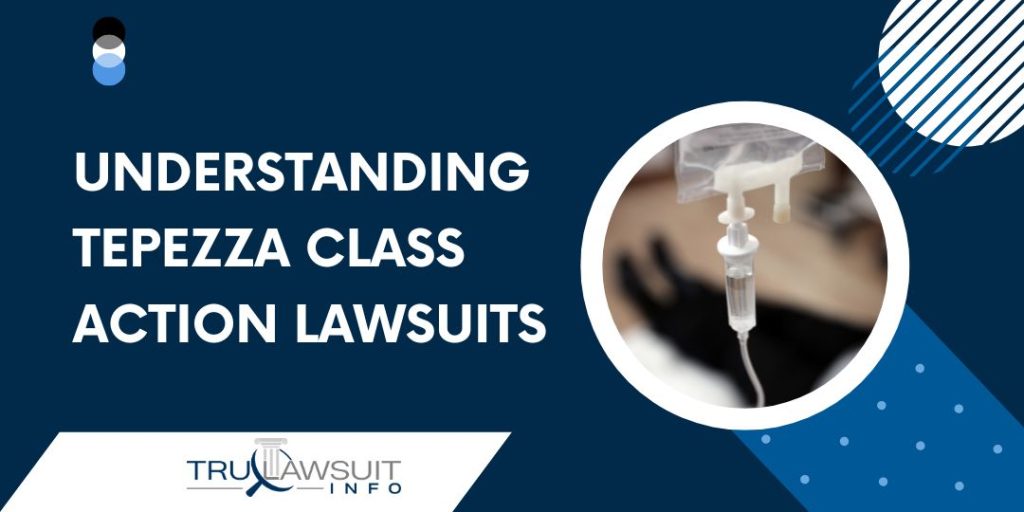
Tepezza, a prescription medication used to treat thyroid eye disease in patients, has been the subject of numerous lawsuits in recent years.
These legal actions, known as Tepezza hearing loss lawsuits, bring together individuals who have experienced similar harm from using the treatment.
Class action lawsuits consolidate multiple patients’ claims into a single legal action against a common defendant, typically a pharmaceutical company, in the case of teprotumumab.
By combining their cases, individuals who have undergone treatment with the drug can collectively seek compensation for their injuries.
This approach streamlines legal proceedings and allows study participants to share resources and evidence during litigation with the Tepezza lawsuit claim.
Joining a Tepezza class action lawsuit can offer several advantages to plaintiffs.
Firstly, it provides patients with increased leverage when negotiating settlements or pursuing trial verdicts in hearing loss lawsuits.
By uniting their claims, plaintiffs can present a stronger case against the pharmaceutical company responsible for manufacturing and distributing teprotumumab, known as Tepezza.
This collective strength often leads to more favorable outcomes for individual plaintiffs represented by our law firm.
Participating in filing a Tepezza class action lawsuit allows patients to pool resources and share the costs associated with treatment litigation.
Legal fees and expenses can be significant when taking on large pharmaceutical companies in district court.
However, by joining forces with other affected individuals and hiring a law firm, plaintiffs involved in the Tepezza hearing damage lawsuit can divide the costs of treatment among themselves and make it more financially feasible to pursue their claims in the district.
Moreover, being part of a Tepezza hearing loss lawsuit class action lawsuit ensures that all plaintiffs with Tepezza cases receive equal treatment under the law.
Each individual’s claim for Tepezza hearing damage lawsuits is evaluated based on its merits.
It is within the context of the overall case against the defendant, who is responsible for causing eye disease and permanent hearing damage.
Drawing Lines between the Tepezza Lawsuit and Previous Drug Litigations
The Tepezza lawsuit stands apart from previous drug litigations due to its unique focus on specific side effects, such as hearing loss, rather than broader health concerns seen in earlier cases.
This lawsuit specifically addresses the treatment’s potential damage to the eye caused by teprotumumab.
Unlike previous drug litigations that often involved widespread harm or undisclosed risks, the teprotumumab lawsuits center around adverse reactions associated with this particular treatment for the disease.
The Tepezza lawsuit highlights the importance of evaluating teprotumumab treatment safety beyond initial clinical trials.
It emphasizes the need for ongoing monitoring of potential long-term side effects that may emerge after a medication hits the market.
Given these unique circumstances surrounding the Tepezza litigation and the treatment with teprotumumab, it is essential to carefully examine its distinct legal implications compared to previous drug lawsuits.
The multidistrict litigation (MDL) process plays a significant role in organizing similar cases under one court for pretrial proceedings.
In this instance, it allows plaintiffs who have experienced similar adverse reactions from Tepezza and TED to join forces against common defendants.
Lawyers specializing in drug litigation are at the forefront of representing plaintiffs.
These attorneys possess extensive experience navigating through complex legal processes and building strong cases against pharmaceutical companies responsible for manufacturing and distributing medications like teprotumumab.
When faced with potential harm caused by drugs, seeking legal consultation for Tepezza hearing loss lawsuits becomes crucial for those affected by treatment.
Consulting with an attorney who specializes in pharmaceutical litigation can provide valuable insights into available legal options and help determine whether pursuing a lawsuit for hearing damage caused by teprotumumab is appropriate based on individual circumstances.
As new class action lawsuits related to hearing damage and hearing loss caused by teprotumumab continue to emerge, a judicial panel may consolidate these cases into MDL.
This consolidation streamlines the legal process, allowing for efficient handling of claims and potentially expediting the resolution for plaintiffs seeking justice.
Evaluating the Allegations of Tepezza against Other Drug Lawsuit Claims
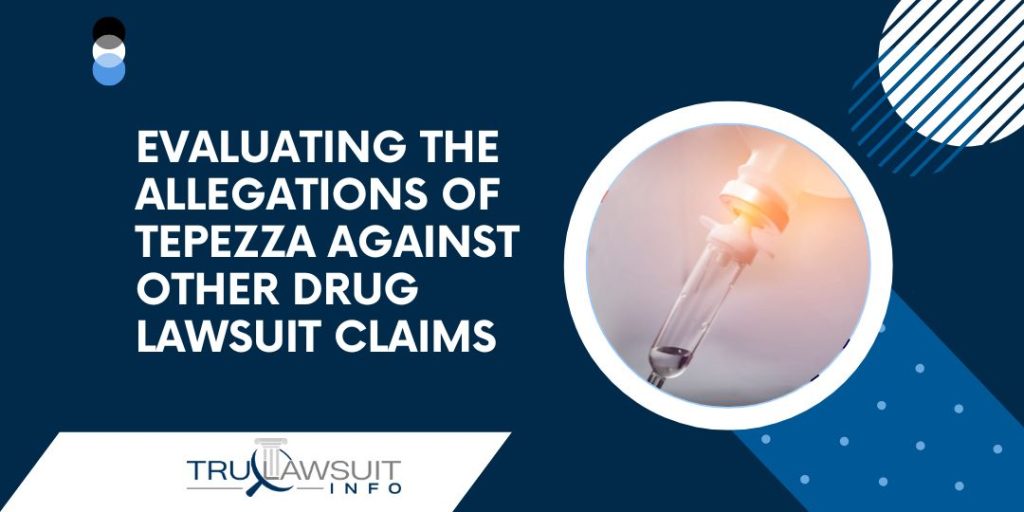
The allegations in Tepezza’s lawsuits revolve around hearing loss, setting them apart from other drug lawsuit claims.
While many dangerous drug lawsuits encompass a range of adverse reactions and symptoms.
Tepezza litigation focuses specifically on this particular medication.
These unique allegations expand the horizon of drug lawsuit claims.
When comparing the allegations in the Tepezza lawsuits with those in other drug cases, it becomes evident that there are varying levels of severity and impact on patients’ lives.
While some drug lawsuits may involve mild side effects or temporary discomfort, Tepezza lawsuits allege more serious consequences, such as permanent hearing loss.
Tepezza’s manufacturer, facing numerous claims from plaintiffs who allege that their use of the drug resulted in irreversible damage to their hearing, seeks compensation for their injuries through legal avenues.
To better understand the implications of these allegations
Thyroid eye disease (TED), also known as thyroid-associated ophthalmopathy, is a condition that affects individuals with an autoimmune thyroid disorder.
Tepezza was approved by the U.S. Food and Drug Administration (FDA) for treating TED and its associated hearing loss and hearing damage based on its efficacy demonstrated during clinical trials.
However, some patients claim that they experienced unexpected adverse reactions after using Tepezza infusions.
Additionally, there have been Tepezza hearing loss lawsuits filed by patients who believe their hearing was negatively affected by the medication.
The approval process for drugs involves rigorous testing to ensure safety and efficacy.
Despite this thorough evaluation, unforeseen side effects such as hearing loss can still emerge once a drug like Tepezza infusions reaches the market and is used by a larger population over an extended period.
Common Tactics Used in the Tepezza Lawsuit and Other Pharma Cases
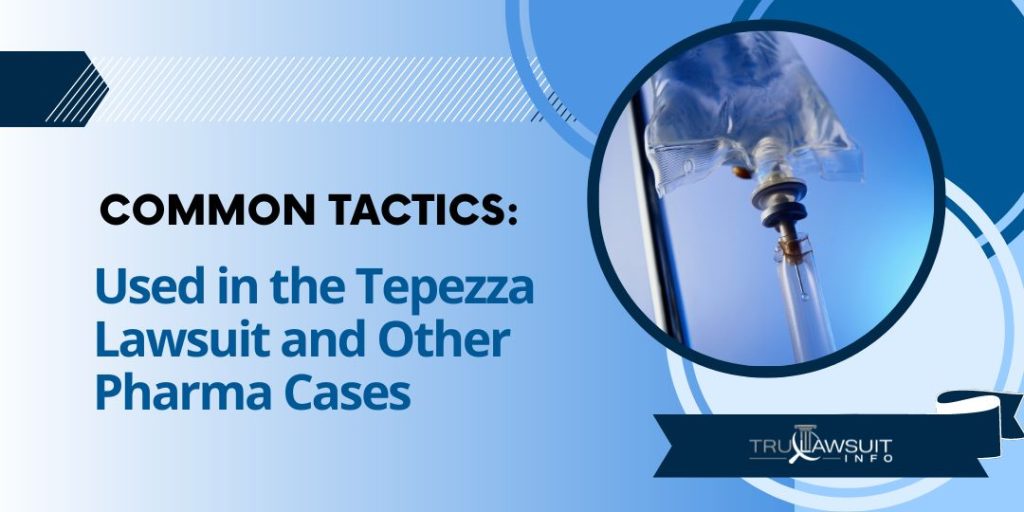
Plaintiffs in Tepezza lawsuits employ various legal strategies to build their cases against pharmaceutical companies.
One common tactic is presenting scientific evidence that links the medication to hearing loss.
By demonstrating a correlation between Tepezza and hearing loss issues, plaintiffs aim to establish a causal relationship between the drug and their alleged injuries.
However, defendants often challenge these causation arguments in law cases.
They question whether Tepezza directly caused the plaintiffs’ hearing loss or if other factors could be responsible for their alleged injuries.
To support their respective positions regarding liability and damages in a lawsuit related to Tepezza, both sides may engage expert witnesses with specialized knowledge of hearing loss.
Their testimonies can significantly impact the outcome of the lawsuit by influencing jurors’ perceptions and understanding of complex medical information related to hearing loss.
Legal teams involved in Tepezza lawsuits also utilize discovery processes
This includes requesting internal company documents and communications that could shed light on potential negligence or misconduct by pharmaceutical manufacturers in the Tepezza class action lawsuit.
Such evidence can be crucial in establishing product liability claims against the defendants for hearing loss caused by Tepezza infusions.
In addition to individual lawsuits, class action lawsuits may arise from allegations surrounding Tepezza or any other pharmaceutical product that can cause hearing loss.
Class actions consolidate multiple similar claims into one legal action, allowing plaintiffs with shared grievances related to hearing loss to collectively seek compensation or other remedies.
Lessons from Past Drug Lawsuits for the Tepezza Case
Previous drug lawsuits have provided valuable insights into the importance of thorough testing and disclosure, especially in cases involving tepezza hearing loss.
These cases have shed light on the significance of strong evidence linking Tepezza to adverse reactions when pursuing legal action against pharmaceutical companies.
One crucial lesson that can be drawn from previous drug lawsuits is the need for comprehensive testing throughout the development process, especially for Tepezza patients.
Inadequate testing can lead to unforeseen complications, putting patients with hearing loss at risk once a drug is on the market.
Rigorous testing should have been conducted prior to FDA approval to ensure safety.
Another important consideration is the role of post-market surveillance in monitoring a drug’s safety profile.
Tepezza lawsuits have highlighted the necessity for pharmaceutical companies to actively track adverse events reported by patients using their medications, especially in relation to hearing.
Other precedents set by past drug litigations
Clear communication between pharmaceutical companies and healthcare providers is crucial for ensuring the safe administration of medications.
Physicians rely on accurate information about the potential side effects of drugs like Tepezza to make informed decisions.
By providing transparent data derived from comprehensive studies, manufacturers can equip healthcare professionals with all necessary information about the potential risks.
Involving in administering new Tepezza Medication infusions, promoting effective hearing and understanding between all parties involved.
Furthermore, previous cases demonstrate how class action multidistrict litigations (MDLs) can be an effective avenue for pursuing legal action against pharmaceutical companies in the context of a hearing.
By consolidating similar Tepezza lawsuits into a single MDL, plaintiffs can pool resources and present a stronger case against the defendant, ensuring a fair hearing.
Compensation Demands in the Tepezza Lawsuit vs. Other Drug Settlements
The compensation demands in Tepezza drug lawsuits are centered around addressing the damages caused by hearing loss, including medical expenses, rehabilitation costs, and emotional distress.
Unlike other drug settlements that may involve broader health concerns or widespread harm, Tepezza’s lawsuit compensation demands are specific to the alleged hearing loss suffered by plaintiffs.
Tepezza litigation is unique in nature as it requires a careful assessment of appropriate compensation based on the severity and long-term impact of hearing loss.
The goal is to ensure that plaintiffs receive fair financial compensation for the losses they have endured due to their use of Tepezza.
When comparing compensation demands in Tepezza lawsuits, it helps establish benchmarks for evaluating the reasonableness of claims related to hearing.
This comparison allows for a better understanding of how much plaintiffs can expect to receive in terms of settlement amounts and benefits for hearing-related issues.
Tepezza Settlement Payouts Provision
Settlement payouts may include various components such as reimbursement for medical expenses related to treating hearing loss, covering costs associated with rehabilitation services aimed at improving auditory function or adapting to life with impaired hearing.
Emotional distress caused by the impact of hearing loss on an individual’s quality of life may also be factored into settlement calculations.
In addition to compensatory damages, punitive damages could be sought in a tepezza hearing if there is evidence of negligence or intentional wrongdoing by the manufacturer or other parties involved in producing or distributing the drug.
It’s important for plaintiffs and their legal representatives to gather supporting evidence documenting their losses when pursuing compensation claims.
This evidence may include medical records detailing treatment received for hearing loss, invoices and receipts for related expenses, and expert testimony establishing the link between tepezza and the alleged hearing loss.
How the Tepezza Lawsuit Might Reshape the Drug Industry in Light of Past Cases
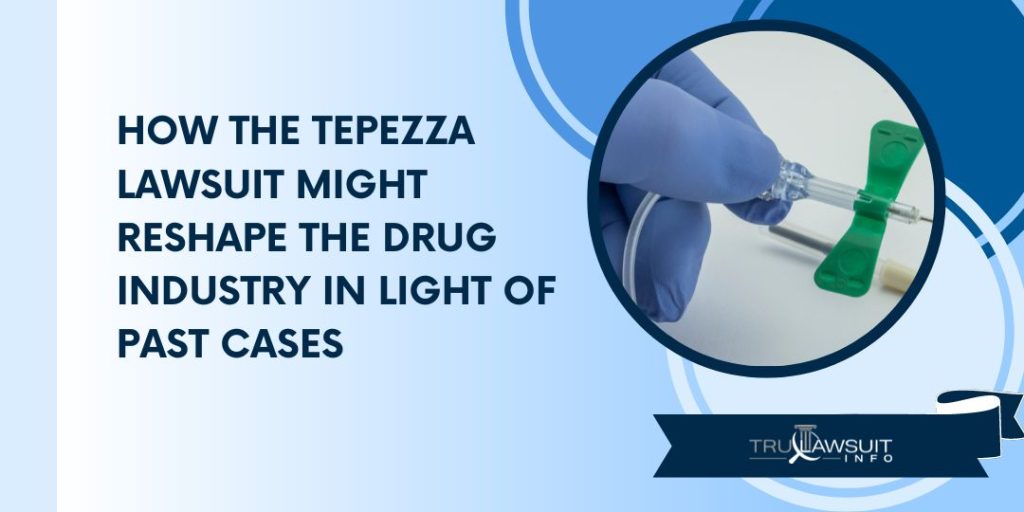
Tepezza lawsuits have the potential to significantly impact the hearing of pharmaceutical companies.
Over the years, past drug litigations have led to increased scrutiny from regulatory agencies, resulting in stricter regulations and improved safety protocols within the industry.
Ensuring the safety of their products, especially in terms of hearing, is paramount.
However, in some cases, unforeseen side effects related to hearing may only come to light after a medication has been approved and made available on the market.
This is where post-market surveillance becomes crucial for monitoring any potential issues with hearing.
One of the key talking points surrounding the Tepezza lawsuits is how they might influence pharmaceutical companies’ approach to monitoring side effects.
In light of previous hearing cases that have resulted in legal action against drug manufacturers, there has been an increased emphasis on transparency and accountability.
Regulations and demand better safety protocols within the industry:
- The Food and Drug Administration (FDA) may require more comprehensive clinical trials or longer periods of observation before granting approval for new drugs related to hearing.
- Regulatory bodies might enforce mandatory reporting of all adverse events related to a particular medication, including any hearing-related issues.
- Pharmaceutical companies may be required to conduct thorough risk assessments prior to launching new drugs into the market to ensure the safety and efficacy of their products for patients with hearing issues.
The outcome of Tepezza lawsuits has the potential to set a precedent for future hearing cases and influence how drug manufacturers approach patient monitoring.
Pharmaceutical companies may become more cautious when introducing new drugs into the market, as they are now acutely aware of the potential legal consequences associated with inadequate monitoring or disclosure of side effects.
Conclusion: The Impact of Tepezza Lawsuits
The Tepezza lawsuits have had a significant impact on the pharmaceutical industry and the patients who have been affected.
Recent developments in hearing loss lawsuits related to Tepezza have brought attention to potential side effects and safety concerns associated with this drug.
Tepezza class action lawsuits have emerged as a means for individuals with hearing injuries to seek compensation.
These legal actions aim to hold the responsible parties accountable and provide justice for those who have suffered harm to their hearing.
The impact of the Tepezza lawsuit extends beyond individual cases. It has the potential to reshape the entire drug industry by highlighting safety concerns, encouraging stricter regulations.
Frequently Asked Questions
-
Yes, if you have suffered harm or experienced complications due to using Tepezza, you may be eligible to join a class action lawsuit.
It is advisable to consult with a legal professional specializing in pharmaceutical litigation to determine the best course of action.
-
The compensation awarded in Tepezza lawsuits varies depending on factors such as the extent of injuries, medical expenses, pain and suffering, and other damages.
Each case is unique, and the amount of compensation will be determined based on individual circumstances.
-
The duration of a Tepezza lawsuit can vary significantly.
Some cases may be resolved through settlements relatively quickly, while others may require more time if they proceed to trial.
Factors such as the complexity of the case and the number of parties involved can influence the timeline
-
In addition to joining a class action lawsuit, individuals affected by Tepezza complications may also choose to pursue an individual lawsuit or explore other legal avenues available.
Consulting with an attorney experienced in pharmaceutical litigation can help determine the most suitable approach for your specific situation.

Attorney Jessie Paluch, founder of TruLawsuit Info, has over 25 years of experience as a personal injury and mass tort attorney, and previously worked as an international tax attorney at Deloitte. Jessie collaborates with attorneys nationwide — enabling her to share reliable, up-to-date legal information with our readers.
Legally Reviewed
This article has been written and reviewed for legal accuracy and clarity by the team of writers and legal experts at TruLawsuit Info and is as accurate as possible. This content should not be taken as legal advice from an attorney. If you would like to learn more about our owner and experienced injury lawyer, Jessie Paluch, you can do so here.
Fact-Checked
TruLawsuit Info does everything possible to make sure the information in this article is up to date and accurate. If you need specific legal advice about your case, contact our team by using the chat on the bottom of this page. This article should not be taken as advice from an attorney.
You can learn more about the Tepezza Hearing Loss Lawsuit by visiting any of our pages listed below:
Here, at Tru Lawsuit Info, we’re committed to helping victims get the justice they deserve.
To do this, we actively work to connect them with attorneys who are experts in litigating cases similar to theirs.
Table of Contents
Tru Lawsuit Info is a reliable source of information about issues that may affect your health and safety, such as faulty products, data breaches, and environmental hazards.
Our team of experienced writers collaborates with medical professionals, lawyers, and advocates to produce informative articles, guides, and other resources that raise awareness of these topics.
Our thorough research provides consumers with access to reliable information and updates on lawsuits happening around the country. We also can connect consumers with attorneys if they need assistance.
Here, at Tru Lawsuit Info, we’re committed to helping victims get the justice they deserve.
To do this, we actively work to connect them with attorneys who are experts in litigating cases similar to theirs.
